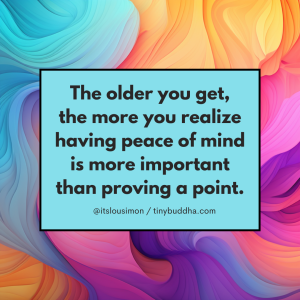
“Children need to feel seen. Adults do, too.” ~Unknown
As a teenager, I played the flute for about nine years. I never practiced—apart from that guilt-ridden last half hour prior to my weekly lessons. It was important for my parents that their children learned a musical instrument, and so I was given the flute, while my brother played the clarinet (bizarrely, because our grandmother had wanted someone to play Mozart’s clarinet concerto at her funeral).
Truth be told, I think my brother would have much rather learned the guitar, while I was very envious of his clarinet (he got around playing Mozart at my grandmother’s funeral, by the way).
Inevitably, we both ditched our instruments as soon as we hit adulthood—except for a few years at university where I played second flute in an amateur orchestra. I had a great time, simply because there is nothing like playing Mussorgsky’s Night on a Bare Mountain as part of an orchestra. It was pure magic.
When I turned forty, I decided that if I ever did want to learn the clarinet, I ought to do it now, rather than wait until retirement.
High Expectations
My clarinet teacher turned out to be a softly spoken man in his fifties, always friendly, ever so polite, someone who had spent his entire career at our local music school and a grammar school for musically gifted children. A fair number of them have been regular (and successful) contestants at the Jugend musiziert competition—a prestigious award for aspiring young musicians here in Germany.
That aside, I knew nothing about my clarinet teacher, so I googled his name (as one does) and stumbled upon an old newspaper article.
In it, he was quoted saying that untalented students gave him no real joy.
Crikey! I was not untalented, I knew that. However, I was quite old to pick up the clarinet, so I reckoned I’d be one of those students he’d rather not teach. Not a nice feeling!
To be fair to him, I have no idea if those lines were his actual words or something the journalist had concluded from what he had said. I never brought up the subject with him. Either way, right from the start, our lessons weren’t quite going the way I’d expected them to go.
For instance, we never covered any basic technique. He obviously expected me to figure this out myself. In the beginning, we focused on simple tunes for children. It felt like he wasn’t even trying to teach me anything. By Christmas, I was so bored that I brought along a clarinet concerto that I had nicked from my brother’s stash of sheet music—just to make a statement.
I will never forget that lesson. The look on his face was priceless. Danzi’s Concerto in C-Major was a million times harder than anything he had ever played with me. Suddenly, I felt like he was treating me a bit more seriously.
Yes, I admit, a part of me felt very smug at his realization that he had underestimated me. Mainly, though, I still felt awful. I sensed I had climbed his approval ranking purely based on my abilities. It was a shaky victory that could be taken away from me just as soon as I made a mistake.
Somehow, it reminded me of something from my childhood. I just wasn’t sure what it was.
Life without Feedback
I practiced harder than I had ever done before. Frustratingly, I never got any feedback from him. No criticism, no praise, nothing. He remained completely indifferent to me. Every lesson was the same: He’d bring along sheet music, and we’d play together. He’d lecture me about the composer or the piece’s musical merits, but no word regarding my ability or the obvious problems I was having with my clarinet.
After a while I felt silly, like a frantic child jumping up and down in front of an adult shouting, “Notice me, notice me, please, please notice me!” I had no idea if I was doing well, or if I was a hopeless case. I had no idea where I measured up in comparison to the rest of the world. I was in limbo.
“I am not learning anything from him,” I kept complaining to my partner, who also happens to be a professional musician. “Well, then talk to him about it or change teachers,” was his pragmatic solution. I didn’t do either, of course.
A Million Miles Just to Feel Seen
Instead, I went on a summer course designed for adults who just play music as a hobby. That’ll show my teacher I am serious about the clarinet, I thought.
I couldn’t find anything suitable in Germany, so I had to go all the way to the UK for that. Even though I don’t regret going (the course was amazing!), I find travel stressful and was already shattered before the course had even started. More than once I asked myself why I was putting myself through all this hassle.
Was I really doing it because I loved the clarinet and wanted to learn how to play? Or was there another reason, one that I perhaps would not like to admit to myself?
I remember pondering this while waiting for the course to start. We’d been asked not to turn up before 6 p.m., so I’d spent the day in Cambridge. It wasn’t university term time, but the streets were crowded anyway with tourists and noise and bustle. It was too hectic for me, plus I was lugging around a heavy backpack and a clarinet case. So I fled to Parker’s Piece, a public park between the train station and ancient colleges of Cambridge University.
As I sat in the grass and watched a local cricket match, it occurred to me that I had literally traveled a thousand miles just to be noticed by someone whose opinion shouldn’t really matter to me. It made no sense to me.
I thought back to my childhood and why I had stuck to playing the flute, an instrument that I had never cared for to begin with. Suddenly it all became very obvious.
Ghosts from the Past: Childhood Strategies to Feel Worthy
Music had been my ticket to recognition. Except that now, apparently, the ticket had expired.
My parents (and indeed our teachers) had always given my brother and me the impression that we were musically gifted. Consequently, a large proportion of my motivation to play the flute stemmed from the fact that I received a pat on the back for it. My grandparents would attend every single concert, no matter how small my part would be. My parents would be there right next to them, beaming with pride. In those moments, I felt loved.
I suppose I played my part well to please my parents, who in turn used my achievements to impress theirs. It’s funny how my parents never ceased to be my grandparents’ children.
Afterward, they would compare my performance to others. Inevitably, my parents concluded that nobody could compete with me. This judgment was seldom correct and entirely unnecessary to boot. It left me with a weird mixture of pride and unease, which I later recognized as my rebellion against the idea that the most important thing in music—or indeed life as a whole—was to be better than everybody else.
What is more, making your self-worth dependent on achievements is a fragile house of cards, because the very moment somebody better than you shows up, your confidence is in tatters.
Yet that was what I had grown up with: The expectation to excel and to be better than the rest. In fact, my mother once admitted to me at point-blank she would have had trouble loving me if I had not been intelligent. In her eyes, only achievements made me a worthy person.
For a child, there is nothing more precious than your parents’ approval. So of course I played the flute, and luckily, I played it well without having to work hard for it.
Dishing out Achievement, Expecting Love in Return
They say that if a childhood issue remains unresolved, it will continue to raise its ugly head in adulthood. You will keep rehashing the same old battles—not necessarily with your parents, but other significant people in your life acting as stand-ins for them. In other words, while the people and scenarios may be different, the underlying psychological mechanisms remain the same. You encounter the same difficulties and resort to the same coping strategies that you used as a child.
My childhood issue was that my parents would only notice their children if we achieved something. Love was not unconditional. It was earned by merit.
My clarinet teacher was not my father, of course, but it struck me that I was jumping through hoops once again to impress somebody, to gain approval. In fact, not long before I had had a similar situation with my horse-riding instructor, a woman who reminded me of my mother in more ways than I care to admit. She was always a little dismissive of me, and I kept doing the same metaphorical jumping jacks in front of her that I was now doing for my clarinet teacher.
She proved a hard nut to crack. When I realized I was never going to get her attention with my riding skills, I reverted to an area where I thought I could impress: photography.
I took photos of her horse-riding events and the horses, hoping she’d like them. She never took much notice, nor did she thank me. When a little while later somebody else started taking photos of her horses, she published them on her website and boasted about them everywhere. I was hurt and jealous.
It was only in hindsight that I understood it had never really been about the photos or my instructor.
I was simply treading old grounds, dishing out achievement and expecting attention in return. To my chagrin, neither my horse-riding instructor nor my clarinet teacher were clued in on the rules of this game that I had played so well with my parents.
I still hadn’t grasped that achievement is no safe route to connecting with others. It was so contrary to anything I had experienced in my childhood.
You Are Enough
I wish I could claim that spotting this pattern in my behavior was enough to magically discard my desire to prove myself. That’s not what happened. I still want to feel seen. I still cherish praise. To some extent, that need is quite normal—acceptance by our peers is, after all, a basic need we all share.
It ceases to be normal, though, when your self-worth is damaged by somebody’s unwillingness or inability to care about you.
Now, whenever I catch myself frantically playing tricks to get somebody’s attention, whenever I feel the need to justify or defend myself, when I do more than is needed, I take a moment to breathe in and say, “Stop. You know your value. It is enough. You are enough.”
What is more, when I realize my issue or coping strategy is really a ghost from my past, I try to protect others from becoming part of a problem that is not theirs. My parents’ attitude toward success is not my clarinet teacher’s fault. It is not fair to drag him into this. It is my issue—not his.
Confidence in the Absence of Approval
Ironically, ever since giving up waiting for a sign of approval from him, I find I can relax in his lessons a lot more. When things go pear-shaped, I remind myself that mistakes are a part of life. I praise myself for the progress I make. I try to be loving and kind with myself.
Will I keep him as a teacher? Probably not. I don’t see myself improving if he fails to give advice on how to play the clarinet. But if and when I do change teachers, I want to be sure that it is for the right reasons, and not because I have self-worth issues. For now, I see my teacher as a great sparring partner to practise confidence in the absence of approval.
In my childhood, I may have felt invisible unless I came home with good grades. However, there is no reason why I should treat myself the same way as an adult. My sense of self-worth is not dependent on achievement or the recognition by others. Or in the words of the wise Buddha:
Peace comes from within. Do not seek it without.
About Ella Luna
Ella lives with two gorgeous cats and a lovely dog in a small house somewhere in rural Germany. She writes purely for pleasure and in the sincere hope that it is helpful for others.













 Though I run this site, it is not mine. It's ours. It's not about me. It's about us. Your stories and your wisdom are just as meaningful as mine.
Though I run this site, it is not mine. It's ours. It's not about me. It's about us. Your stories and your wisdom are just as meaningful as mine. 